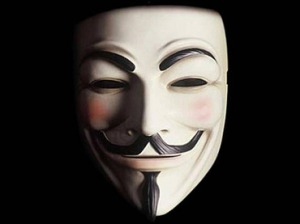Expect Us
Until 2003, the word “Anonymous” was only defined as something or somebody that was nameless. In 2003, a group named Anonymous started in an imageboard named 4chan. When a non-user posts something, the posts are credited as being “Anonymous”. A joke began to start amongst users that Anonymous was a real person. The 4chan was often used to discuss violence in England. Eventually, some users and non users began picking up a cause, but most of the time they would just find people to pick on by making prank calls or sending unpaid pizzas to people’s houses.Many of these individuals were computer hackers and eventually they began using more sophisticated ways of working, these will be discussed later.
Mostly, Anonymous communicates through imageboards, internet forums, Internet Relay Chat, and wikis. They way an idea becomes an act is by one person posing an idea online and if enough people like the idea, they agree to support it and it becomes action. If not enough people like the idea, it just goes away.There is no individual leader. They wear Guy Fawkes masks (made famous by V for Vandetta) to emphasize the idea that they are a collective. There is no such thing as Anonymous membership, but computer hackers in Anonymous do have a certain hierarchy about them in terms of skill. Individuals working with Anonymous are known by the public known as “hacktivists” (computer hackers/activists…clever, huh?).
Some of their means of hacktivism include DDOS, prank calls, spam emails, ordering pizzas to somebody’s door, hacking, and live protests. The most famous of these is DDOS or distributed denial of service attacks. Basically, this is when a group of people send so many requests to a site that the site cannot handle it and they shut down. Anonymous can use applications which can send thousands of requests from one computer on which the ip address has been concealed. These attacks can take only six people such as in HB Gary, or they can take a couple hundred people such as in Operation Tunisia.
Anonymous has taken on a whole slew of causes, especially censorship. In 2009, they coordinated a DDOS attack on the International Federation of the Phonographic Industry for convicting The Pirate Bay of copyright infringement. A statement of theirs read “We will continue to attack those who embrace censorship. You will not be able to hide your ludicrous ways to control us.” Once protests against SOPA began, the Department of Justice website was shut down by a DDOS attack in less than two hours. The attack disabled a number of websites, including those belonging to the Justice Department, the FBI, Universal Music Group, the Recording Industry Association of America (RIAA), the Motion Picture Association of America (MPAA), and Broadcast Music, Inc.
More recently, Anonymous has begun taking stake in the Palestinian/Israeli conflict after Israel decided to bomb the Gaza Strip. Anonymous has DDoS’d over 650 websites, wiped databases, and leaked passwords. Some deleted databases include the Israel Ministry of Foreign Affairs and the Bank of Jerusalem. This has opened up a whole new sense of warfare to condemn or support groups, even over seas.
I’m not sure that I can say at this point whether or not I am in support of Anonymous at this point. Obviously they are a powerful group, and they bring together many members of the public, so public opinion has a big influence on their actions. However, to quote Uncle Ben, “With great power comes great responsibility.” I’m just not sure that we should trust a group of people who don’t have any sort of rules or established limits on what they will do. What if a group of corrupt Anons rose up and began taking out public school computer systems or prison systems? They would be nearly unstoppable.  -b. hench
-b. hench
